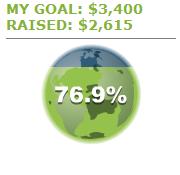The reflections presented on this blog are only the opinions of Matt Leslie. I apologize for any inaccurate, delayed or incomplete information. My education is in Microbiology not International Development and while I am to present well rounded and critical reflections, I apologize if I come across as narrow minded.
Power and Privilege 101
To learn and become aware of power and privilege, YCI provides its volunteers with a package of information. This information helped to challenge some of my views and made me think very critically about my intentional/unintentional actions.
There were two things that really made me think. The first was an article called "White Privilege: Unpacking the Invisible Knapsack", which I would strongly recommend that you read. Sure it seems intimidating to read and if you don't have the time, then just read from page 5 onwards.
The second thing was a scenario type question that helped to challenge some of my automatic assumptions. I'd like to share the scenario with all of you readers:
Picture a couple on vacation somewhere in the Caribbeans. The sun is shining and the water is crystal clear blue. The couple is walking along the edge of the water, waves lapping at their feet. They stop every once in a while to pick up shells and admire them. They splash each other playfully in the water, and after a while they get out of the water and let the sun dry their bodies. They head back to their hotel and get ready for dinner. Just before heading to the restaurant, while they stand on their balcony overlooking the beach, he pops the question: will you marry me?
Were the people in your image while? Were the people in your image young? Were the people in your image a man and a woman?
My reflection question for this activity is:
How does working from an anti-oppression framework reinforce working from an asset based approach?
Working from an anti-oppression framework means actively working to shift power towards inclusiveness, equality, accessibility and social justice. It means listening to all points of view. It means creating a safe environment for conversations to be had and to respectfully challenge others opinions and views. It means challenging the behaviour rather than the person. It also means ensuring that anti-oppression is embedded in everything that you do.
When I worked as a Residence Assistant, I was taught different strategies for working from an anti-oppression framework. As an RA, I met hundreds of different students, coming from all over the world. It was part of my responsibility to make sure that all of the students within the building (or at the very least my section) got along well with one another. This frequently included challenging behaviours such as homophobia, sexism or various other forms of prejudice.
By working from an anti-oppression framework, the volunteers and other project members will be respectful of each other allowing different opinions to be shared when making decisions or planning events. It will also help us volunteers work with the youth at the community centre. I'm sure that there are going to be many cultural differences, and know that I may have some questions. Also by fostering a safe and open environment, the youth we are working with will hopefully feel comfortable to ask us questions and/or challenge our behaviours.
I think that by working from an anti-oppression framework will compliment the asset based approached employed by YCI. By being inclusive and equal, it will help us recognized the strengths of the community centre, other volunteers and the youth.













